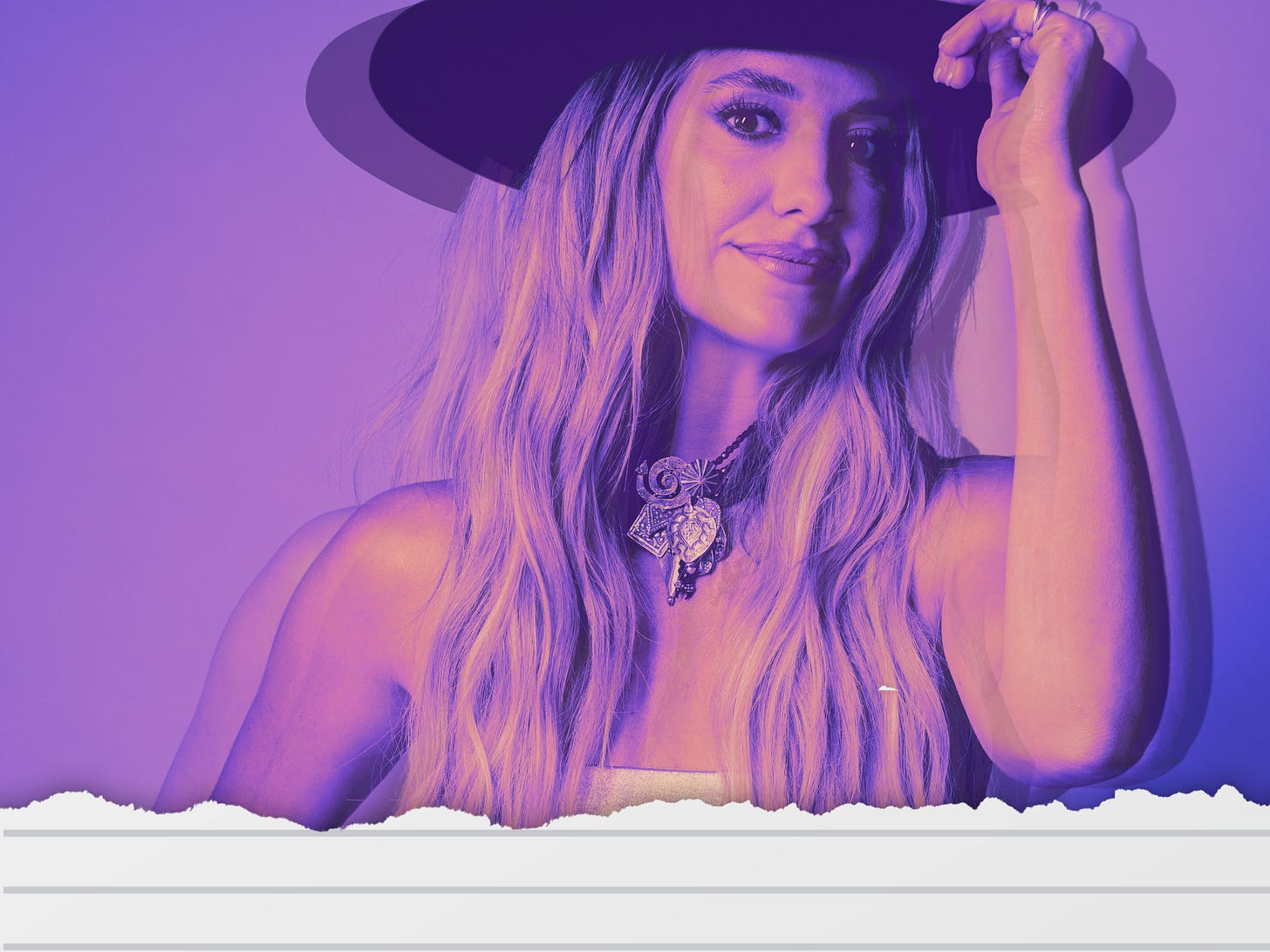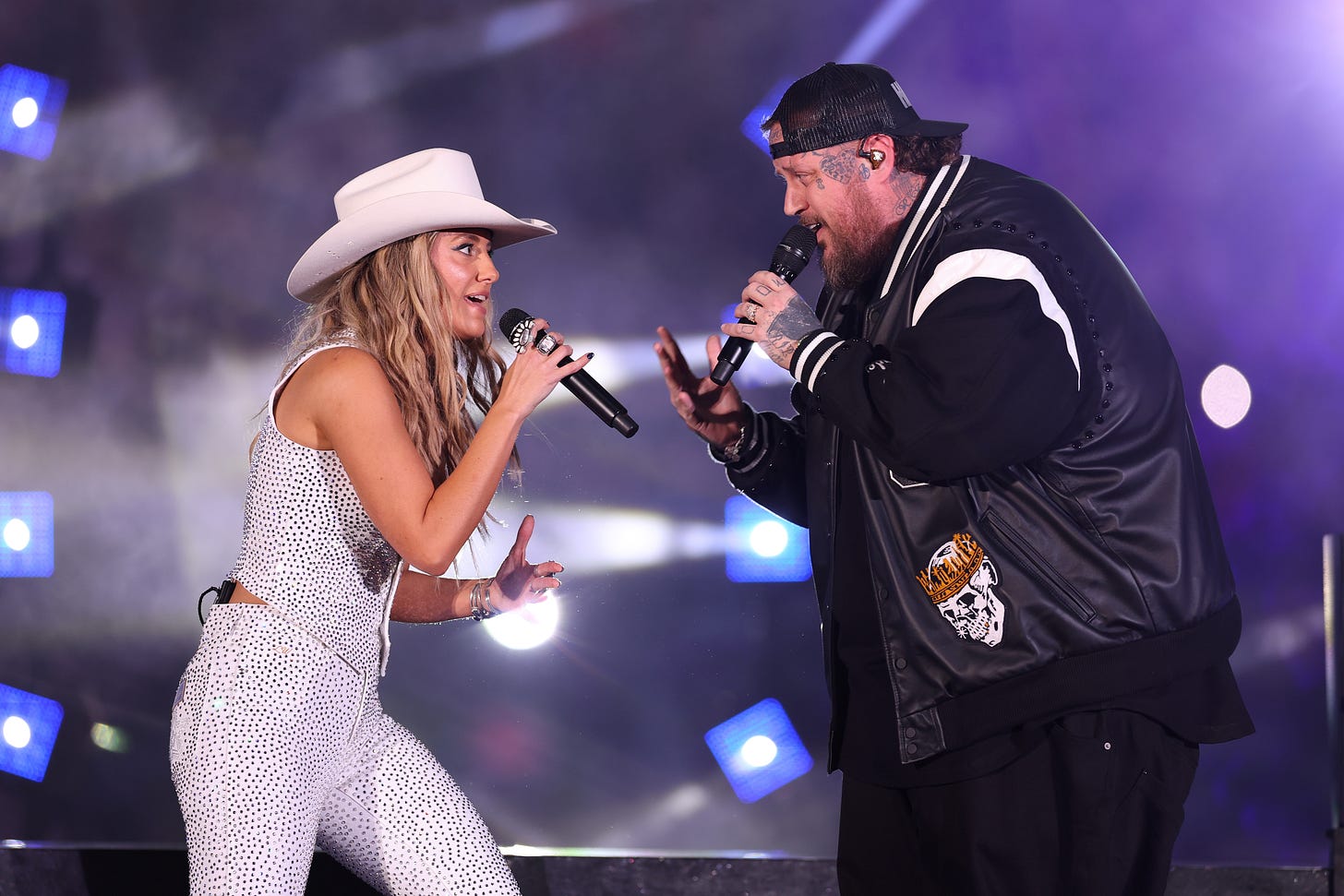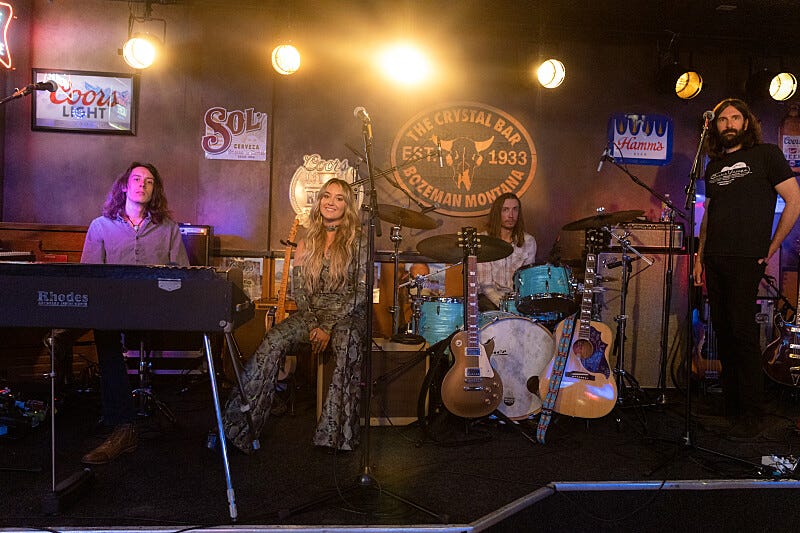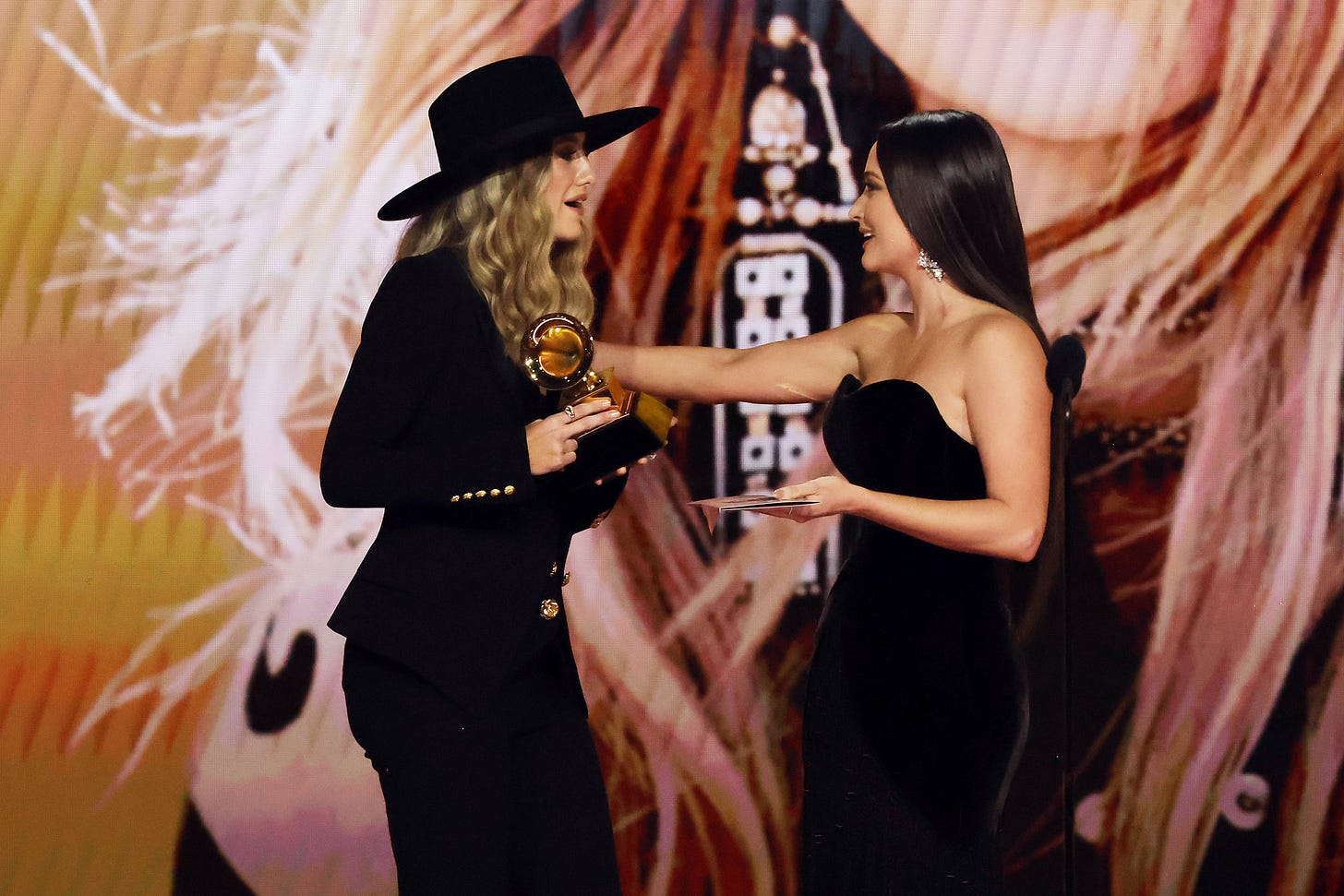Lainey Wilson: 'I'm Just Going to Keep Telling the Truth'
The country star began the year with a Grammy and ends with an Oscar-contending song from 'Twisters' (plus another 'Yellowstone' turn)

Rob LeDonne writes Notable. He recently interviewed Elton John and Brandi Carlile about “Never Too Late,” their title song for John’s biodoc, and Maren Morris and Kris Bowers, who collaborated on “Kiss the Sky” for The Wild Robot. You can reach him at rob@theankler.com
This week, I’m galloping into the American Heartland with the help of country star Lainey Wilson. I spoke to Wilson right after her moody hit for Universal Pictures’ Twisters, “Out of Oklahoma,” landed on the Oscars’ original song shortlist, revealed earlier this week.
Wilson’s in good company, along with previous Notable subjects Maren Morris (The Wild Robot’s “Kiss the Sky”) and Elton John and Brandi Carlile (“Never Too Late” from John’s biodoc of the same name). This year’s 15-song roster features Pharrell and Robbie Williams (both nominated for songs from their own unorthodox biodocs), lauded composer Nicholas Brittell (Blitz’s “Winter Coat”) and even Kristen Wiig, nominated for her song from Will & Harper, “Harper and Will Go West.”
Lin-Manuel Miranda, just an Oscar away from EGOT status, is shortlisted for writing “Tell Me It’s You” from Mufasa: The Lion King, and two songs from Emilia Pérez made the cut (“El Mal” and “Mi Camino,” performed in the film by Zoë Saldaña and Selena Gomez, respectively). Before you start protesting, yes, Diane Warren was also included in this year’s shortlist for her and H.E.R.’s The Six Triple Eight track “The Journey.” Here’s the full list.
Of course, the Oscars isn’t the only awards show making waves in music pre-holidays, as honorees for two big run-up events to the Grammys also were announced this week. Alicia Keys will accept this year’s Dr. Dre Global Impact Award at the fourth annual Recording Academy Honors Presented by the Black Music Collective in L.A. on Jan. 30. Two days later, the 2025 Clive Davis Pre-Grammy Gala, held the day before awards, will honor chairman and CEO of Universal Music Publishing Group Jody Gerson.
Gerson and her colleagues have extra reason to make merry, with Mariah Carey’s 30-year-old pop carol, “All I Want for Christmas is You,” notching its 16th week at No. 1 on the Billboard Hot 100, which ties her longest run atop the charts. I caught the classic live Barclays Center earlier this week, during the final show of Carey’s Christmas Time tour, where the icon signed Rihanna’s chest. Or as RiRi put it: “Mariah Carey is signing my tit, y’all!”
Elsewhere in superstar oversharing, Billie Eilish — who just welcomed Charli XCX on stage in L.A. for the live debut of their viral “Guess” remix — revealed in her eighth annual Vanity Fair interview that her 2024 was filled with “good sex.”
In less satisfying news, the Recording Academy has withdrawn a nomination for the rapper J-Kwon, whose 2004 track “Tipsy” is sampled in Shaboozey’s smash hit “A Bar Song (Tipsy).” Rules are rules: An artist behind sampled material of a nominated song is eligible only for a certificate, not a Grammy trophy.
Regardless, Shaboozey’s incredible run with his rootin’, tootin’, booze-soaked country-pop crossover earworm speaks to a larger trend of the American Heartland saturating more and more popular culture. Take Beyoncé’s Cowboy Carter and Post Malone’s collab-heavy F-1 Trillion, or the mainstream explosions of artists from Jelly Roll to Morgan Wallen. Or consider the broad appeal of Yellowstone — where Wilson made her acting debut in 2022, also appearing on the series’ Dec. 15 finale, its highest-rated episode ever.

They’re all proof points of a broader trend Sarah Unger wrote about for The Ankler this summer, arguing that American Heartland audiences are vastly underserved, and “it’s time for Hollywood leaders to get the memo — the one blowing into town on the powerful winds of Twisters’ expectation-exceeding box office debut.”
Judging by the inclusion of Wilson’s “Out of Oklahoma” on the Oscar shortlist: Memo received. “Country music has always been a storytelling medium, and I think we’re seeing a renewed appreciation for that,” Kevin Weaver, president of Atlantic Records and producer of the Twisters soundtrack, tells me. Weaver and his team recruited a who’s-who of the genre’s most respected stars to contribute songs for the compilation, including Luke Combs, Thomas Rhett and Miranda Lambert. “We worked with artists who genuinely understand the Heartland experience — its values, struggles, and dreams,” he says.
Wilson, 32, raised in Baskin, Louisiana by a farmer dad and a schoolteacher mom, fits that bill. She won the Grammy for country album earlier this year for Bell Bottom Country, and she’s gunning to repeat that honor in February with Whirlwind — aptly titled, considering her Twisters ballad could also spin her into the Dolby Theater in March.
Wilson took time out for our chat from a family vacation in Baskin, where “people treat me exactly the same as they always have,” she says, even though they named a local stretch of Louisiana Highway 15 after their hometown hero.
‘A Song That Takes You a Little Bit of Everywhere’
Rob LeDonne: What was going through your mind when the Oscars shortlist came out and your song was on it?
Lainey Wilson: All I could think about was when I wrote my first song at nine. At the time, I was thinking that I was probably just going to be writing music for people like me, who grew up in a town of 180 people — people who grew up on a farm and things like that. So, you just never know, and that’s the beauty of all this. It’s just about taking risks and keeping it going, because you’re not sure where it’ll lead.
RL: Country fans in particular can sniff out a false image right away. Aside from your talent, what do you think you’ve done differently to corner the market in the heartland? Is it just an inherent authenticity?
LW: When you are an artist, with whatever you put out there I think it has to be true to you. If you’re writing a song about riding a horse, saddling up a horse, or changing a tire on the side of the road, they can tell whether you can do that or not. People want to believe that they’re listening to somebody who is telling their truth. I’m just going to keep on telling the truth because that seems to be what’s working.
RL: I know storytelling is a big touchstone not just in your career, but your family. How did that impact your work?
LW: Well, I’ll tell you, we would sit around the kitchen table, cause when you’re from where I’m from, either you’re working or you’re sitting around the kitchen table hearing the same old stories you’ve been hearing for years. And I think that’s really where I got bit by the storytelling bug. My mama and daddy would tell these stories from their childhood, and my daddy had so many stories about things like when he was younger this horse did a cartwheel, kicked him in the face, so he fell and then jumped up. And every single time he tells them, they get bigger and better.
But those stories that they told me made me very proud of where I came from, proud of the way that I was raised and even proud of the way that my parents were raised. Just the idea of getting back up when you fall down — and funny stories too. We would just be on the edge of our seats, just leaning in and listening. I could see it. I could hear it. I could smell it. That’s the kind of story that I want to tell.

RL: Take me to your hometown of Baskin. What’s it like when you go back?
LW: I’ll tell you what, the people treat me exactly the same as they always have. It’s not ‘Lainey Wilson’ to them, I’m just Lainey. And that’s what I love about it. I mean, these people here are my people and the reason I am who I am is because of them. They’re the kind of people who show up when you need them to, and they even show up when you don’t really need them to. They’re just there, and they’ll give you the shirt off their back.
We don’t even have a stoplight. Though they named the highway after me, so that’s pretty cool! The same highway that I got a ticket on when I was 15 and didn’t have my license, by the way. But Baskin is a farming community and during corn season, it’s nothing but corn, wheat, soybeans, oats. That’s what my daddy farms.
RL: Your co-writer on “Out of Oklahoma” is Shane McAnally, who is known for his work with Kacey Musgraves and on Broadway’s Shucked. How did you get together?
LW: When I was living in my camper-trailer in Nashville, I would go to The Listening Room and I’d hear these songwriters play, and I remember specifically hearing Shane and just thinking he was just the coolest songwriter ever. So he’s been on my list of writers that I wanted to write with. So when I was kind of given this assignment, between me and my publisher, we brought Shane and Luke Dick, and it was the right combo. Those guys have written enough songs that if you say, “Hey, write about that blade of grass over there,” they’re gonna be able to not only do that but feel everything that blade of grass feels.
RL: How did the lyrics come about?
LW: They brought me out to L.A., sat me down and said, “Hey, do you think you could write over this scene?” Specifically, it’s about when the character of Kate (Daisy Edgar-Jones) was going home, back to Oklahoma, and she has lots of feelings about it. The truth is, it’s bittersweet for me coming home, too. I was able to really understand Kate. I felt like I didn’t even need to see the rest of the movie to understand how she felt coming back.
Especially when I was living in Nashville and dating people from Louisiana, then you break up and you come back and then you see things that remind you of them. So it was all of those feelings. I had the idea for the title, “Out of Oklahoma,” and for the melody, the thought was for it to feel like a tornado and kind of go up and down, and make a song that takes you a little bit of everywhere.
I think we were the very first artists that the soundtrack team asked us to join. Later when they told us they were going to feature people like Luke Combs and Tyler Childers as well, I thought, “Man, if they can pull this off, it’s really going to be cool.” Because I cannot remember the last time anything like that has been done, at least for country music.
RL: You’ve said you consider yourself a songwriter first. What is it about the craft that speaks to you?
LW: I find inspiration in a bunch of different places, like thinking back to old memories or sitting down and having a conversation with somebody. Or even overhearing somebody at a bar. I put these little nuggets in my back pocket and then when I sit down with the people that I love to write music with, we always say, “The best idea wins.”
To tell you the truth, I think songwriting in general has just made me a more understanding, compassionate person. I've learned a lot about life. When you’re sitting down to write a song with two or three people, you’re hearing a few different sides to any story. These are people that you really get to know and that you love and they become some of your best friends, but at times they know more about you than you do about yourself. So it has made me view the world a little bit differently.
What I’ve realized from being able to travel the world, play music and meet people from so many different walks of life is that we’re all actually a lot more alike than you think. And that right there brings me a lot of peace and comfort.
RL: Let’s finish at the start of your year when you won the Grammy for best country album. What do you remember about that night?
LW: I was looking around, and I was thinking, “How in the world did I end up here?” I got to meet Taylor Swift that night, shake her hand and tell her that when I was 14 years old, I saw her play CMA Fest Riverfront Stage. I think she was like 16 and there were like 10 people there, and me and my family were one of them! But just being able to be in a room full of just such incredible, talented people who have inspired me was awesome and when I met them, it felt like they thought the same about me. Everybody wants that respect and recognition, and I don’t take it lightly.




